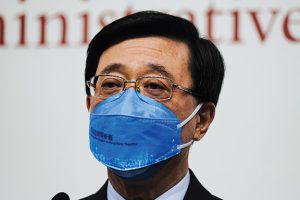Bloomberg
John Lee, named Hong Kong’s next chief executive in a rubber-stamp election that’s been
criticised as unfair, vowed to strengthen national security and accelerate the city’s integration with mainland China.
Speaking in Cantonese and English shortly after his victory was announced, the former police official and security minister outlined his service to China and Hong Kong and said his new job calls for accountability to both Beijing and the city. His administration will continue to uphold the rule of law, which is a “core pillar of sound governance,†he told reporters.
“Safeguarding our country’s sovereignty, national security and development interests, protecting Hong Kong from internal and external threats and ensuring its stability will continue to be of paramount importance,†he told reporters at the Hong Kong Convention and Exhibition Centre, the election venue.
Lee, 64, served on the police force for more than three decades before joining the security ministry, epitomising China’s focus on national security after a wave of massive and sometimes-violent democracy protests in 2019. He helped incumbent Chief Executive Carrie Lam crack down on the demonstrations and implement a powerful Beijing-drafted national security law that’s resulted in the arrest of some 182 people and the closing of at least a dozen news organisations.
The ballot was the city’s first to be held in more than two decades without at least a nominal contest. Lee was the only candidate put forward to an election committee revamped by Beijing in 2021 to stack more pro-establishment members.
The changes to the system made it all but impossible for an opposition candidate to compete, while the Communist Party’s endorsement of Lee rendered his victory a fait accompli.
Out of the 1,424 valid votes cast by electors, Lee won 1,416 — more than the simple majority needed to confirm his appointment. Eight electors voted against him, while four ballots were declared invalid.
The voting process drew criticism from the European Union, which called on Chinese and Hong Kong authorities to abide by their national and international commitments, particularly the aim of electing the chief
executive and members of the legislative council by “universal suffrage.â€
The EU said it “regrets this violation of democratic principles and political pluralism and sees this selection process as yet another step in the dismantling of the ‘one country, two systems’ principle.†Eight Hong Kong activist groups based in Europe urged governments and parliaments not to recognise the vote, saying “the new leader will be nothing more than a dormant figure controlled by Beijing.â€
Samuel Chu, founder of Washington-based The Campaign for Hong Kong said Lee is the “designated enforcer†for Beijing, “who oversaw the transformation of one of the freest cities in the world into one of the most repressed.†But the Hong Kong and Macao Affairs Office of China’s State Council said the election represented “another successful practice†of the new system and the city is poised for a brighter future.
 The Gulf Time Newspaper One of the finest business newspapers in the UAE brought to you by our professional writers and editors.
The Gulf Time Newspaper One of the finest business newspapers in the UAE brought to you by our professional writers and editors.
